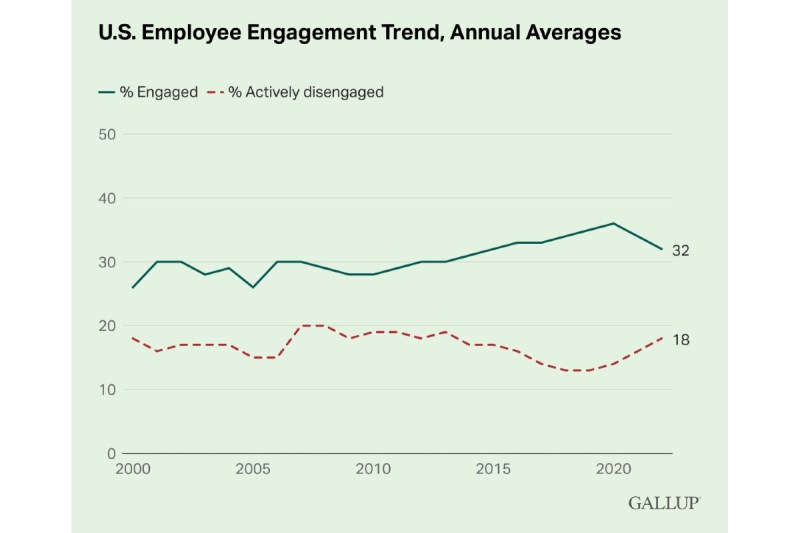A recently released Gallup poll found that 50% of American workers were in the process of “quiet quitting.” What is quiet quitting, you ask? It’s the essential definition of apathy. People who perform the minimum required tasks while simultaneously psychologically detached from their work. This is contrasted by extremes on both ends: engaged employees (32%) and actively disengaged (18%).
Half the U.S. workforce, therefore, fit Gallup’s definition of being “not engaged” and likely looking for a new job.

While this is not good news, some employers don’t seem to be responding to the need for a more purposeful, healthier, collaborative, and well-paid workplace. A disturbing new trend, “quiet firing,” is instead emerging. Recently, the term went viral when TikTok influencer DeAndre Brown helped to introduce the term “quiet firing” — as when a workplace fails to adequately reward its employees for their organizational contributions, and hence, forcing them to leave.
@imdrebrown Quiet firing? Not elite! #quietquitting #quietfiring
“Quiet firing is basically when you are doing the work within your job description and you are living up to job responsibilities, however, your job is not showing you a check,” Brown said. “ ‘Why am I not getting the raise? Why am I not getting the promotion?’ If this is happening to you, your company is taking advantage of you.”
Brown lays out an urgent issue: you need to stand up for yourself at work, be assertively encouraging (without being annoying), and if the people who employ you don’t respond, you need to find a new place to go. So, the question remains: how can you tell that you’re being quietly fired? Let’s turn to Annie Rosencrans, director of people and culture at HiBob – a modern HR tech platform designed for modernizing companies. (The following has been edited for clarity.)
TM: What are some signs that your employer is quietly trying to push you out the door?
Annie Rosencrans: While there aren’t set rules to determine if someone is being quietly fired, a worker who feels that this may be happening can look for these signs:
- They are consistently skipped over for promotions and raises; then, when this happens, they are not given feedback as to why this has happened.
- They are not being given constructive feedback on assignments or tasks. Rather, it’s being edited by a manager directly, or their efforts aren’t recognized — even if it does not need revising.
- They are being given assignments that are below their abilities while others at their level are being assigned more desirable or mentally challenging tasks.
- They are not being given important information needed to succeed at or excel in their role.
- Their direct manager isn’t taking proper time to connect with them individually, and cancels almost every touch-base without reason or rescheduling.

TM: Should an employee try to improve their work output, collaboration, effort, and/or other factors to try and escape this trap?
Annie Rosencrans: A worker who is fearful of quiet firing should feel empowered to raise their concerns directly with their manager. If workers feel they aren’t getting the feedback and opportunities needed to be successful in their role, their first step should be to address the issue head-on with their manager. They should ask for feedback and be open to criticism.
If an employee doesn’t know where their faults lie, it may be hard for them to know the necessary changes to make. It’s important for HR and managers to proactively give feedback and have individual meetings so the employee can be confident about their performance and standing in the company.
TM: Other than salary, what are some integral things people need to feel appreciated by employers and satisfied at work?
Annie Rosencrans: Employees need to feel appreciated by their employer to want to stay at a company. Workers value positive feedback, constructive criticism, flexibility, room for advancement and salary increases, and a safe environment to be able to speak up and voice any concerns or share ideas freely. A company that fosters a ‘quiet firing’ environment will be at risk for a ‘quiet quitting’ culture because of a clear disconnect between managers and their team members.
TM: How can employees go about either earning and/or feeling more valuable at work?
Annie Rosencrans: Here’s what HR leaders should remember: an employee who is ‘quiet quitting’ shouldn’t trigger an employer to start ‘quiet firing’ them. It’s more helpful for managers to have an honest conversation about why an employee’s perceived motivation or engagement levels have fallen so the issue can be remedied. A people-first manager and company will prioritize having frequent check-ins with team members to make sure their performance doesn’t slow and that they aren’t flight risks.
TM: Should an employee address their concerns about not being valued enough?
Annie Rosencrans: If you’ve mentally checked out and are feeling physically burnt out, it may be a sign of negative company culture. At HiBob, we put an emphasis on flexible work so that employees feel we trust them to get their work done in their own time. We have frequent one-on-ones to check in with employees – something I personally do each week with my direct reports. While it can be difficult to detect quiet quitting, I have found that meeting with employees helps detect someone’s engagement and if they need support or extra encouragement.
TM: What might be some strategies for approaching employers?
Annie Rosencrans: While approaching an employer can be nerve-wracking, it’s imperative in a healthy work environment that employees feel comfortable scheduling individual meetings and asking for feedback. If you don’t feel comfortable going directly to your manager or HR, consider asking a trusted colleague or mentor for help navigating that conversation.
TM: How can employees recruit advocates or mentors at their place of work?
Annie Rosencrans: Having a support system and a listening ear through a mentorship program helps employees in more junior roles develop their confidence and leadership skills. The direct line to upper management can help employees understand their value within their teams, which can create a stronger connection to their company and better morale. For employees to either have these connections made through a work program or reaching out to someone senior and asking for advice, employees will be able to gain a mentor that can share advice, offer tips, and be a safe space to voice concerns or stresses.
TM: When is it time for people to look for new work?
Annie Rosencrans: If it looks like a layoff/furlough is pending: the current job market is continually changing and unpredictable. If your coworkers are being laid off or furloughed, it may be time to look elsewhere.
- No advancement opportunity: You might feel stuck if there is no chance for career advancement. If you are continuously passed over for a promotion, it’s probably time to refresh your resume.
- You and your work aren’t valued: You may be feeling under-appreciated because of a lack of positive feedback, a subpar work environment, or perhaps there’s little support from supervisors or colleagues. But if every night gives you the Sunday scaries, it might be time to dust off your resume.
- You’ve learned all you can: If you are feeling overqualified for your job, your career may be stalled. Try asking your manager for more challenging assignments. If they can’t offer you more stimulating projects, that’s a good sign that it’s time to start exploring other opportunities.
- The salary isn’t in line with your worth: If you are feeling underpaid and overqualified, that’s a red flag. Try to negotiate a higher salary before you look for a new job. Research compensation and make a case based on your contributions and value. That said, considering the current climate, employees should be mindful that there are a lot of companies wrestling with pay increases.
- Toxic work environment: A toxic work culture can not only affect your career growth but may also harm your mental and physical health. If you find that you’re in an organization where bullying is tolerated, morale is low, or your opinion isn’t valued, you may want to explore your options.
- Company and personal values don’t align: Since our professional and personal lives are more intertwined than ever, it is vital that our companies share our values.
TM: How much effort should employees who are actively searching for new work put forth at what they hope is their old job?
Annie Rosencrans: When looking for a new role, employees should still exert the same amount of effort into their jobs. It’s important not to burn bridges during the job search or transition process, as you never know when you’ll run into an old colleague or boss in the future. You may also need your colleagues as references down the road, so continuing to perform at your best will be beneficial to the team and yourself.
Great advice here from Rosencrans and HiBob regarding quiet firing. Even a workplace that doesn’t show appreciation for your work is not a good situation, but you can help alleviate that pressure with the excellent above direction. These guidelines come down to common sense, advocating for yourself, and remaining diligent about what you do, no matter how your employer may be treating you.



